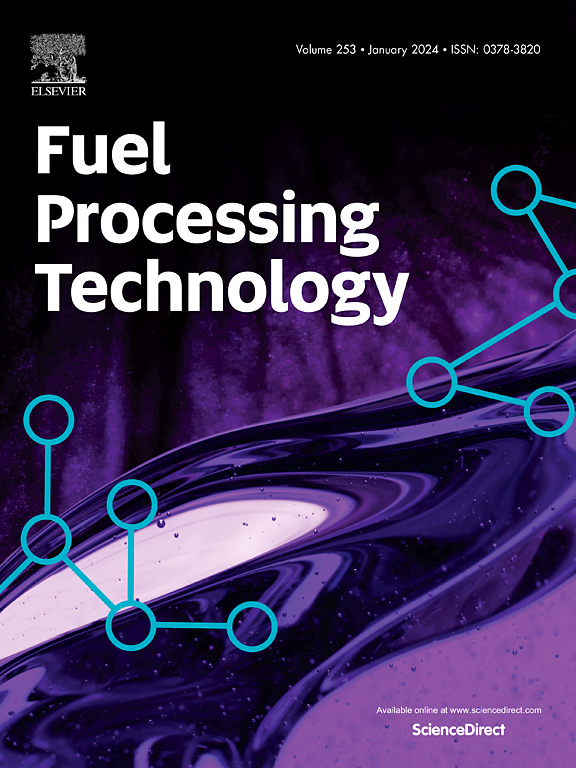Unraveling the pivotal role of amylopectin in enhancing hydrothermal stability and filtration control of native corn starch-based drilling fluids for decarbonization
IF 7.7
2区 工程技术
Q1 CHEMISTRY, APPLIED
引用次数: 0
Abstract
Enhanced utilization of native starch offers a promising approach to improving energy efficiency and advancing decarbonization, thereby fostering sustainable and eco-friendly practices in petroleum extraction. However, previous studies suggest limited high-temperature potential of native starch in water-based drilling fluids (WBDFs), mainly due to insufficient research on amylose-to-amylopectin ratios. This study investigates the hydrothermal stability and filtration control performance of corn starches with different amylose-to-amylopectin ratios in WBDFs to address this issue. The results demonstrate that amylopectin content significantly influences the hydrothermal stability and filtration control performance of WBDFs. Waxy corn starch, with 100 % amylopectin content, exhibits excellent performance, achieving a filtration loss of only 7.2 mL even at 160 °C. In contrast, as the amylopectin content decreases, the temperature resistance of normal corn starch declines below 140 °C, while high-amylose corn starch shows poor filtration control even at 120 °C. The key factor contributing to these differences is the amylopectin content. The “clustered or chrysanthemum-like” structure and multi-branched chains of amylopectin enhance bentonite interactions, improving colloidal stability and particle distribution. Slower degradation of amylopectin also boosts hydrothermal stability and dense mud cake formation. The findings of this study provide a theoretical framework for utilizing native starch in WBDFs.
揭示支链淀粉在提高天然玉米淀粉基钻井液的水热稳定性和过滤控制脱碳中的关键作用
提高天然淀粉的利用率为提高能源效率和推进脱碳提供了一种有前途的方法,从而促进了石油开采的可持续和环保实践。然而,先前的研究表明,水基钻井液(WBDFs)中天然淀粉的高温潜力有限,主要是由于对直链淀粉与支链淀粉比例的研究不足。为了解决这一问题,本研究研究了不同直链淀粉与支链淀粉比例的玉米淀粉在wbdf中的水热稳定性和过滤控制性能。结果表明,支链淀粉的含量对水热稳定性和过滤控制性能有显著影响。具有100%支链淀粉含量的蜡质玉米淀粉表现出优异的性能,即使在160°C下也仅达到7.2 mL的过滤损失。而随着支链淀粉含量的降低,普通玉米淀粉在140℃以下的耐温性下降,而高直链淀粉在120℃时的过滤控制能力较差。造成这些差异的关键因素是支链淀粉含量。支链淀粉的“簇状或菊花状”结构和多支链增强了膨润土的相互作用,改善了胶体稳定性和颗粒分布。支链淀粉的缓慢降解也提高了水热稳定性和致密泥饼的形成。本研究结果为wbdf中天然淀粉的利用提供了理论框架。
本文章由计算机程序翻译,如有差异,请以英文原文为准。
求助全文
约1分钟内获得全文
求助全文
来源期刊

Fuel Processing Technology
工程技术-工程:化工
CiteScore
13.20
自引率
9.30%
发文量
398
审稿时长
26 days
期刊介绍:
Fuel Processing Technology (FPT) deals with the scientific and technological aspects of converting fossil and renewable resources to clean fuels, value-added chemicals, fuel-related advanced carbon materials and by-products. In addition to the traditional non-nuclear fossil fuels, biomass and wastes, papers on the integration of renewables such as solar and wind energy and energy storage into the fuel processing processes, as well as papers on the production and conversion of non-carbon-containing fuels such as hydrogen and ammonia, are also welcome. While chemical conversion is emphasized, papers on advanced physical conversion processes are also considered for publication in FPT. Papers on the fundamental aspects of fuel structure and properties will also be considered.
 求助内容:
求助内容: 应助结果提醒方式:
应助结果提醒方式:


